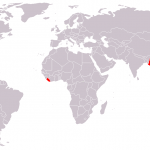The power of social media
Social media is transforming all professional activities today, and science is not an exception. Iva Filipovic, from University of Belgrade, gives some advice on how to unleash the power of social media for the benefit of your lab work and your career.

Iva Filipovic, Molecular Biology Student at the University of Belgrade, thinks that scientists should use the social media in order to keep up with new research developments, increase their productivity and improve their personal research efficiency.
Let’s face it. You are a 21st century scientist and you simply have to be online.
That doesn’t mean you need to be crass wearing Glass. You also don’t have to appear on Naked Scientists (unless you want to). It only means you are taking a couple of minutes a day to explore the online community in a way that suits your needs.
It is crucial to be online and share your science. You can share it in two ways:
- One is with your peers, in the science society.
- The other one is reaching the tax payers—the public—and convincing them their money is spent for the right cause. (But don’t worry. You don’t have to deal with the public if you are busy working at the bench.)
Time can be saved
So let’s say you decided to apply for a grant. You have a question ready and all there is left is to fill out the forms. Since you dread the paperwork, you decide to procrastinate a little so you just make yourself a cup of coffee and at the same time go on Twitter to see what’s up, and … lo and behold! Through a retweet of a follower of your follower you see that a publication has just come out in which your grant question has been answered by someone else. In this way, being online can save you quite some time.
In a similiar situation, you might reply to a tweet and engage in a discussion—which can lead to you being offered an internship. It happened plenty of times before.
It doesn’t matter which your social network you settle for in the end. Once you choose it, you can filter information and receive only updates and news you want to read about. In a way you create your own customized morning newspaper to go with the cup of coffee.
It is easy to get overwhelmed and carried away in today’s era of information flooding but as long as you follow only what is of interest to you, you should do just fine in the online science community.
Iva Filipovic, University of Belgrade
—currently at The John Innes Centre, Norwich, UK
|
1 |
Iva’s starting points
Younger generations of scientists, as already inevitably trapped in the abyss of social networking, are most likely familiar with all possible ways of online science communication. But if you, or someone you know, would like to get started, here are some starting points.
LinkedIn
This is a social networking website which is used mainly for professional networking. LinkedIn basically serves as your online resume. You constantly add and edit your work and community experiences. It can then be used to find jobs, people or business opportunities which are recommended by someone in your network. Or vice versa, employers can search for potential candidates.
Lab roots
Lab roots is a mixture of Facebook and LinkedIn for scientists, incorporating some of the features from both. You are able to access publications, follow group topics and participate in discussions through posting questions, comments, videos, images and other files. There is also an option of entering into monthly scientific photo contests and you can win thousands of dollars and prizes.For those who are not able to attend an event at the moment, there are live streams of thousands of scientific events, conferences, seminars and webinars. You can also find and post jobs from all over the world.
Nature Network
Here you are given a wide range of possibilites – you can engage in groups, forums, blogs, messaging, events. You can use the ‘people’ section of Nature Network to look for the likeminded scientists or see who your contacts are linking up with. It’s a great mean to collaborate, solve day to day problems, see another perspective or just have fun hanging out with other scientists.
Research Gate
ResearchGate links researchers from all over the world. You can add your publications and access millions more, making your research visible. You can also connect with colleagues, peers, co-authors and specialists in your field. Or you can just get the stats about views, downloads, and citations of your research which gives you a feedback.
Twitter
Twitter is a personal favorite of many people. It’s a social networking site that limits posts to 140 characters. It is useful for in-the-moment conversations and customized news streams.
Phrases beginning with a hash/pound sign allow users to aggregate tweets according to a topic. You decide who you are going to follow and if drawn back to your tweets, person/organization/instution may decide to follow you back.
Twitter is very popular today amongst researchers as you can get the live stream of meetings and symposiums. Actually, people who respond to tweets from a conference are a crucial part of that conference and can participate in discussions, ask questions that will be replied to by the lecturer, etc. So your voice can still be heard, even if you are not physically there.
140 characters is enough to trigger natural curiosity that lies within each one of us. For instance, on your Twitter feed you may see a name and a quote of a lecturer at a particular event, google it, find a lab page and maybe even a collaboration comes out of it.
- Build a social media strategy wisely - July 22, 2014
- Visual eloquency with Wordle word clouds - July 2, 2014
- The power of social media - July 15, 2013









Leave a Reply
Want to join the discussion?Feel free to contribute!